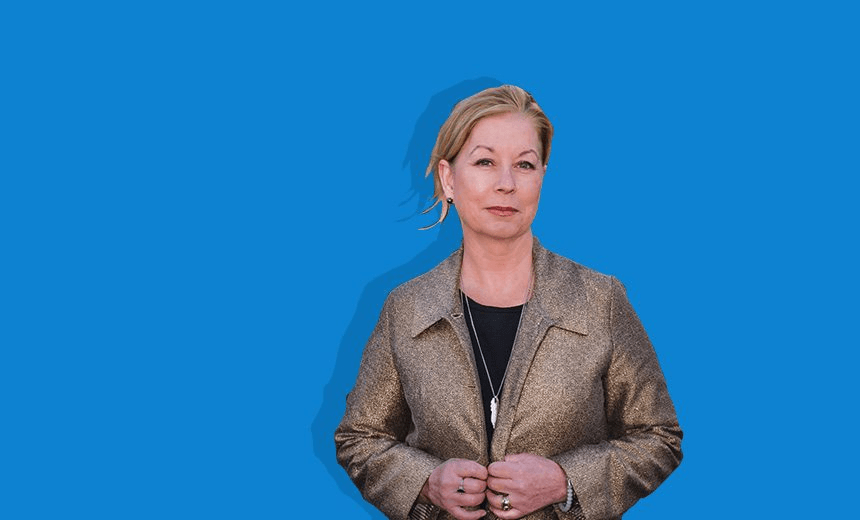‘Business is Boring’ is a weekly podcast series presented by The Spinoff in association with Callaghan Innovation. Host Simon Pound speaks with innovators and commentators focused on the future of New Zealand, with the interview available as both audio and a transcribed excerpt.
What do a revolution in middle-class cooking, a re-energised and more professional music awards, and the invention of a word that put some journos in trouble, have in common? When we’re talking about My Food Bag, the Vodafone New Zealand Music Awards, and ‘starkish’, it’s Pead PR, the leading PR firm out of Auckland run by Deborah Pead.
PR is a business with many preconceptions but it’s not all events, bubbles, punishing hours, and sweating over toothpaste releases although those are in the mix. The rise of influencers, a more commercial media, and business strategy make the communications piece big business. Deborah joined us in the Spinoff bunker to chat over her career, her business, and how PR works.
Either download (right click to save), have a listen below, subscribe through iTunes (RSS feed) or read on for a transcribed excerpt.
You mentioned briefly about engaging with the media in a way that they find positive. What were the kind of things that you brought to the mix that you set up so successfully?
Well, I think many years ago, the PR industry was quite different to the way it is now. I think it’s fair to say that brands weren’t engaging with media in the same way they are now. A lot of PR businesses in those times were set up to shut down comment, and I think the PR industry were almost afraid of the media. Whereas I have never been scared of the media – I see them as allies, even though I know they hate that! But that’s my perspective. I always see media as a conduit to a much wider and bigger audience. When you adjust your attitude to how you perceive media, you adjust the way you interact with media. And then the challenge for brands; was to help them understand how to use the media outside of in an advertising sense.
The early parts of my career were in the retail industry, so I always had a deep fascination with how the consumer interacts with brands. When you walk through a supermarket aisle, what makes you reach out and grab that particular product? And just in the wider retail industry, looking at what people put into their baskets and understanding why – it’s always more than the price and the position. There’s another connection. I had a good amount of time to develop that understanding and that fascination, and bringing those learnings to branding and PR has always stuck with me.
How have the conversations changed? I can imagine that earlier on there would have been, ‘Make a case for this investment [in PR]’, but now it’s very much accepted as part of the mix.
I think the change in the conversation is who we’re having the conversations with or what we’re using to have these conversations. The media now is just one conduit to a bigger audience. Our smartphones have changed everything for us. Now we access information in every format possible. I mean, there’s a new app coming out every day, some other application on how to communicate or tell your story… I just can’t keep up with it all. Thankfully I’ve got a team of millennials who do that all for me.
The number of conduits and channels we use has altered dramatically. The storytelling has never changed.
When we look at those new conduits – influencers for example, who have come up as another form of media, in their own way – are we seeing a growth of pay for play? Which is much more prevalent in other countries than it has been in New Zealand.
Influencer marketing is a vital part of the mix now, especially if you’re trying to engage with millennials. If you don’t have them in your mix then you’re missing an opportunity.
In terms of pay for play, I think that of course some sort of payment is necessary… but if you’re only doing it for money you lose that authenticity of the relationship for the brand. Consumers aren’t gullible, they can see when a place has been paid for and when it’s overly commercial. That’s why our preferred approach is to go with a smaller group that have good numbers and develop strong and authentic relationships with them… those relationships will stand the test of time. We give them information and special privileges as payment, and in exchange they need to be genuinely enthusiastic about the brand.
When you scroll through Instagram, sometimes it just feels like a collection of things your mates have been sent for free. And a lot of them will be posting the same products on the same day, and it can feel not very special. Do you focus more on the not so easily got?
There’s two types of influencers. There’s one type who build an audience because they want free stuff, and there are others who are professional about building their own channel. And we work with the latter, because they understand the value in building a long-term relationship with the brand.

